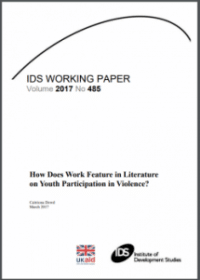
Policy highlights:
- Young people are seen as the primary agents of violence in fragile and conflict-affected contexts. Un- and underemployment, and other forms of social and economic exclusion, create conditions that drive some towards engaging in organized violence and conflict. Job provision is insufficient to prevent participation in violence. For at least some forms of violence, other factors, including injustices and wider patterns of marginalization (of which work status may be one) need to be addressed.
- The relationship between work and violence can be framed in different ways that include economics, marginalization, grievances, frustration or respect and status as motivations for violence. Un/underemployment intersects with other forms of social and economic exclusion to create conditions in which some young people are more likely to engage in organised violence and conflict. Only participation in lower-intensity and less-organised forms of violence appear to respond positively to economic incentives (such as work creation) alone.
- Not all un- and underemployed youth participate in all forms of violence. In order to formulate proper interventions, policymakers need a deeper understanding of when, how, and who participates and in what types of violence, and what opportunities this presents for intervention, conflict management and conflict prevention. Here, the heterogeneous definitions of the concepts youth and violence should be considered.









